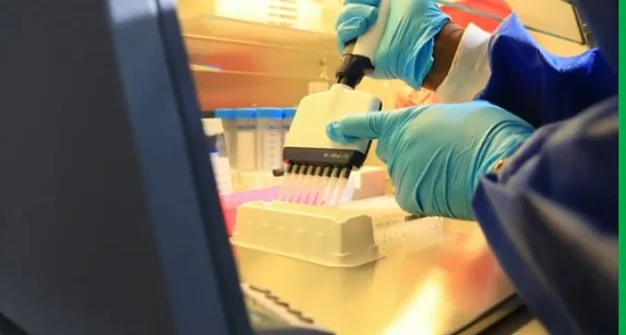Makerere Hospital Launches First Olink Proteomics Platform in East Africa

Makerere University Hospital has officially launched the Olink Proteomics Platform, the first of its kind in East and Central Africa.
The platform was launched on Thursday and attended by leading figures from academia, government, and the global health research community.
The platform introduces cutting-edge Proximity Extension Assay (PEA) technology, which allows researchers to identify and quantify thousands of proteins from minimal sample volumes with high sensitivity and specificity.
This enables early detection of disease and helps uncover novel biomarkers that can shape new approaches to diagnostics and treatment.
Developed in collaboration with Olink Proteomics, Wellcome Leap, and the iTECH Project, the facility marks a transformative step in Uganda’s health research infrastructure.
The platform will be used to study a wide range of conditions, including pre-eclampsia, cancer, HIV/TB, malaria, heart disease, diabetes, and emerging infectious diseases
Speaking at the launch, the chief guest and Minister of Science, Technology, and Innovation, Dr. Monica Musenero expressed strong optimism and governmental commitment to integrating the platform into national research and innovation strategies.
"I feel that we are ready, and this has come at a time when we are ready to really absorb, not only absorb, but leap away with it. Makerere University has opened this up for us as a nation. We receive this with both hands," she said.
"We cannot keep talking while babies are dying. Certain diseases are said to be incurable, but I believe we are at a phase where science can transform life. This lab should become a tech development center, not just for research, but for products that solve real problems."
She also highlighted that the platform aligns with Uganda’s National Development Plan (2025–2030), where science, technology, and innovation are prioritized to drive national development.
Makerere University Vice Chancellor Prof. Barnabas Nawangwe stated that the platform will be crucial in strengthening Makerere University’s role as a leading research institution in Africa.
"This launch marks a huge advancement in science and contributes significantly to one of our missions to generate knowledge and provide solutions to societal issues. It will empower our students and inspire young scientists," he stated.
"Let us not only aim for publications, but for solutions. Let us transform Makerere University, Uganda, and Africa through science and innovation."
A Homegrown Solution for African Research
Dr. Sam Ali, Principal Investigator of the iTECH Project, underscored the platform’s ability to retain and empower African researchers.
"This is the first automated Olink workflow on the African continent. Until now, many samples had to be sent abroad. Today, researchers can do the work here, in Uganda," he noted.
"This platform is not limited to pregnancy-related research. It can address fetal growth issues, gestational diabetes, and a wide range of diseases through various discovery panels like Explore, Target, and Flex."
Dr. Ali confirmed that the platform meets international quality standards, equivalent to Olink’s reference lab in Sweden.
Dr. Charles Olaro, Director General of Health Services at Uganda’s Ministry of Health, framed the launch as essential to addressing critical health burdens.
"We are often seeing patients when it’s too late. This technology will help us detect diseases like hypertension in pregnancy, diabetes, and cancer much earlier," he said.
"It supports our shift toward evidence-based decision-making and personalized healthcare. This is especially crucial for Uganda, where disease burden is complex and compounded by late presentation."
Olink’s Global Vision
Tarif Awad from Olink Proteomics provided insight into the platform’s transformative role in understanding disease biology.
"Proteins are indicators of both health and disease. Proteomics helps us identify disease mechanisms at the molecular level," he said.
"This platform can help answer important research questions across disease categories, offering a hypothesis-free, discovery-driven approach."
The launch of the Olink Proteomics Platform at Makerere University Hospital is more than a technological upgrade, it signals a new chapter in Africa’s scientific and healthcare journey.
Delivering the keynote address at the launch, Prof. Sarah Stock, Program Director of Wellcome Leap’s In Utero initiative, highlighted the importance of the new platform in advancing early disease detection.
She noted that its ability to precisely identify biomarkers would help facilitate earlier interventions for illnesses that heavily impact the region, including malaria, HIV, and tuberculosis.
“It also opens doors for collaborative research, with potential to inform global health strategies and attract partnerships across the continent and beyond,” she said.
With state-of-the-art tools, robust training partnerships, and visionary leadership, the platform is poised to not only transform research outcomes but also directly impact patient care and health policy across the region.



0 Comments